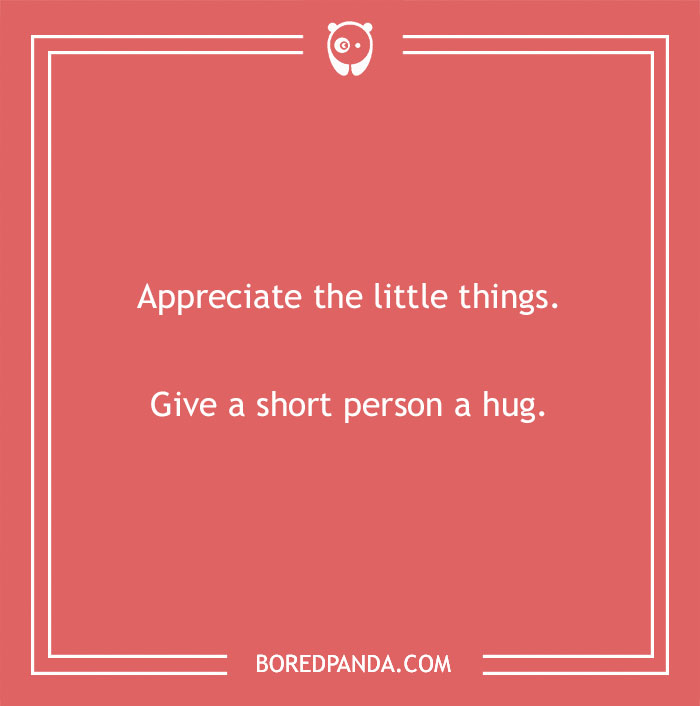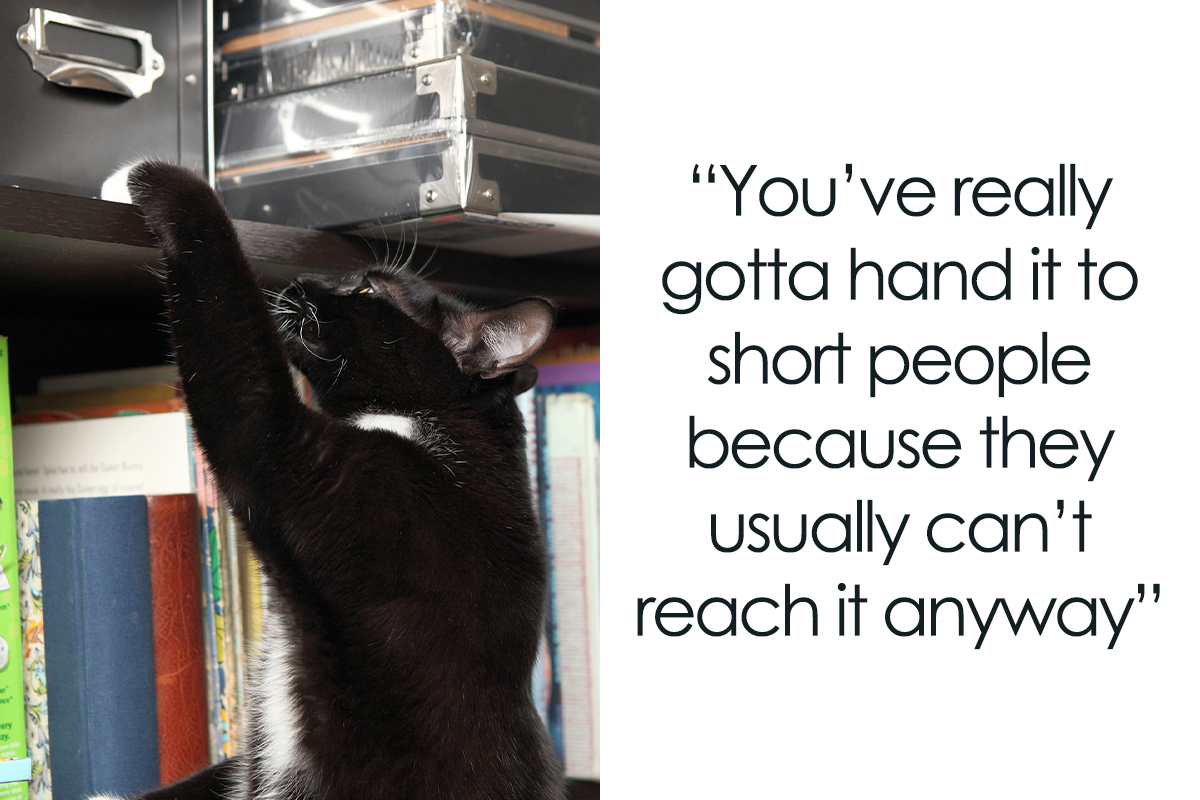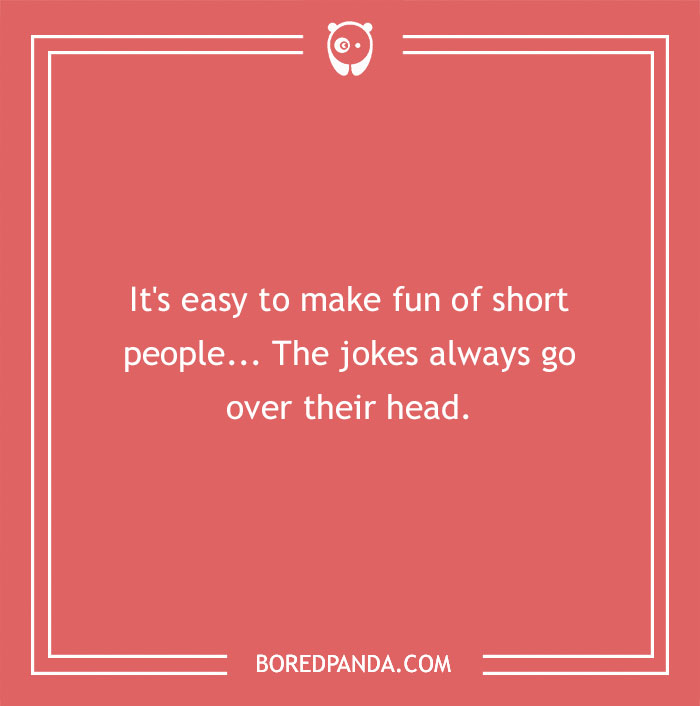Short People Jokes & Roasts: Hilarious Comebacks!
Are height jokes truly harmless fun, or do they mask a more insidious form of social judgment? The persistent focus on height in humor, whether playful or malicious, highlights an ingrained societal bias, where physical stature becomes a basis for ridicule and even exclusion.
The realm of humor is often seen as a safe space, a place where boundaries can be stretched and sensitivities tested. However, when it comes to height, the lines between lighthearted banter and potentially harmful commentary can become blurred. While a witty retort can often diffuse a tense situation, the frequency and nature of height-related jokes warrant closer examination.
The prevalence of height jokes stems from a variety of factors. Height is a readily observable physical trait, making it an easy target for humor. It is visually apparent, easily exaggerated, and often carries with it preconceived notions and stereotypes. The very act of pointing out someone's height, or lack thereof, can serve as a quick shorthand to establish a dynamic of power or dominance in social settings. In a culture that often equates height with authority and physical prowess, short people might find themselves the butt of the joke, regardless of their individual qualities.
It is important to understand that what starts as a playful jibe can easily morph into something more cutting. When height-related jokes are delivered with a condescending tone, they can chip away at a person's confidence and self-esteem. Even if intended as harmless, such comments contribute to a culture where physical appearance is constantly scrutinized. This constant assessment of appearance is likely to be amplified in a world saturated with social media, where carefully curated images of "perfection" are often promoted.
In the workplace, school, or even in casual social interactions, height can become a focal point for bullying. This bullying can manifest in the form of persistent jokes, exclusion from activities, or even more overt forms of harassment. The impact of such behavior is more than just a momentary sting. Studies have shown that bullying can lead to anxiety, depression, and a general sense of social isolation.
It is worth recognizing that the context of a joke plays a crucial role in determining whether it's lighthearted or hurtful. If the humor is aimed at a short person, and the comment is shared with empathy, it can be taken in good spirits. However, it is vital to remain sensitive to individual reactions. A joke that one person finds funny might offend another.
The social dynamic, too, is key. When a joke is shared between friends or acquaintances, it is usually perceived differently than a comment by a stranger. The strength of the relationship impacts how such things are considered, and the recipient's willingness to embrace humor. A shared history of good humor can make someone feel comfortable.
A crucial step in addressing height jokes is to promote a culture of respect and sensitivity. This means speaking out against disparaging comments, even when they are seemingly harmless. If an individual is called "short" as a means of ridicule, it's helpful for bystanders to speak up and address the behavior.
This situation requires those targeted by these jokes to develop comebacks that are clever, humorous, and sometimes even sarcastic. Such comebacks can be a means of empowerment, as they highlight the ridiculousness of the comments. A witty response can change the narrative and make you the star of the conversation.
A good comeback does not necessarily involve anger or aggression. Instead, a confident, self-assured response can often disarm the perpetrator of the joke.
It's worth noting that people of shorter stature have throughout history achieved great things. The world is replete with examples of individuals of shorter height making enormous contributions in arts, science, politics and business. Those achievements can serve as inspiration and proof that height has nothing to do with someone's abilities or character.
One strategy is to deflect the criticism and turn the joke back on the person making the comment. Sometimes, humor is the best method. By accepting the joke but highlighting the inherent absurdity of focusing on height, you can make the joke irrelevant.
Here is a simple example:
Person A: "Wow, you're short!"
Person B: "And you're surprisingly observant."
Another strategy is to use humor to show the absurdity of the situation. This could include referring to other characteristics or bringing up things that have nothing to do with height, which shows you cannot be affected by the joke.
Consider another response:
Person A: "Why don't you try reaching for the stars?"
Person B: "I would, but I'm already busy being down to earth."
When facing bullies, it's necessary to remember the golden rule: aim to roast, not to ruin. While the primary goal is to have the other person stop, you should not stoop to a level of negativity where you become the bully. Instead, use humor.
Another strategy is to use the joke in your favor, and lean into it. Sometimes the best way is to accept the joke about height.
Here's an example:
Person A: "You're so short, can you even see over the counter?"
Person B: "No, that's why I have to ask for all the good stuff."
It's important to remember that short people, in reality, have great things to say. They can be mentors. They can be leaders.
Some very famous people have been short. When someone points out your height, the best response is, "I love what I am."
Ultimately, navigating height-related humor requires a combination of self-awareness, quick wit, and a commitment to fostering a more inclusive and respectful social environment.
Consider the following table.
| Category | Details |
|---|---|
| Definition of "Short Person" | Generally refers to individuals whose height falls below the average height for their respective population. This is a relative term and the cutoff point varies depending on geographic location and gender. |
| Prevalence of Height Jokes | Height jokes are a common form of humor, often used to poke fun at individuals perceived as shorter than average. The prevalence of these jokes is influenced by societal beauty standards, media portrayals, and the ease with which height can be observed and commented upon. |
| Psychological Impact | Height jokes can have a negative psychological impact, leading to feelings of self-consciousness, low self-esteem, and social anxiety. Constant exposure to such jokes can contribute to body image issues and a sense of being different or inferior. |
| Social Implications | Height jokes can perpetuate stereotypes and biases, reinforcing the idea that height is a measure of attractiveness, competence, or social status. This can lead to discrimination and prejudice in various aspects of life, including personal relationships, professional opportunities, and social interactions. |
| Combating Height Jokes | Individuals can combat height jokes by developing witty comebacks, cultivating self-confidence, and promoting a culture of respect and acceptance. Bystanders can also play a crucial role by challenging height-based humor and advocating for inclusivity. |
| Famous Short People | History and contemporary society are replete with examples of successful and influential individuals who are considered short. These role models can inspire confidence and demonstrate that height does not limit one's potential. |
| Resources | For further information on height-related issues, consider consulting resources from organizations that promote body positivity and combat discrimination, as well as articles from reputable psychology and sociology publications. Verywell Mind |



Detail Author:
- Name : Kaci Gibson
- Username : elsie.fisher
- Email : ciara73@gmail.com
- Birthdate : 1973-09-30
- Address : 634 Brisa Branch Suite 348 Spinkastad, WV 20790-4131
- Phone : (458) 607-6440
- Company : Hill-Larson
- Job : Child Care Worker
- Bio : Excepturi qui occaecati dolore labore. Perferendis quia laborum et exercitationem minima consectetur.
Socials
facebook:
- url : https://facebook.com/helga_smitham
- username : helga_smitham
- bio : Doloremque est et eius voluptas cupiditate. Sequi quos voluptatibus ipsam.
- followers : 2038
- following : 1045
tiktok:
- url : https://tiktok.com/@smitham2022
- username : smitham2022
- bio : Saepe laboriosam voluptatem ex facilis numquam ipsum nihil harum.
- followers : 292
- following : 488